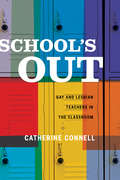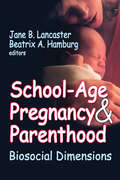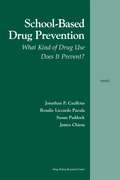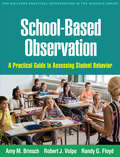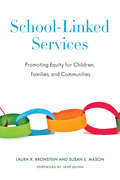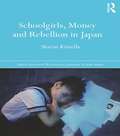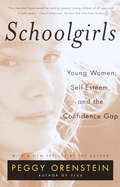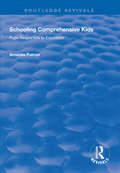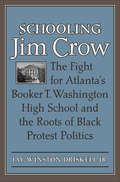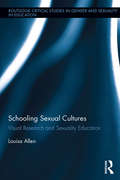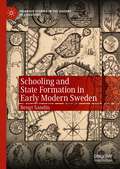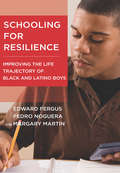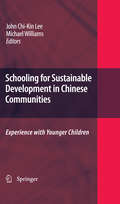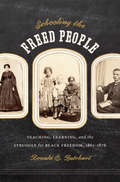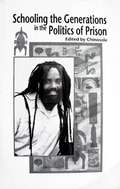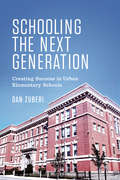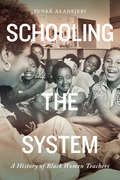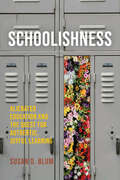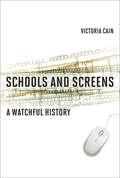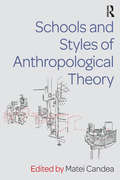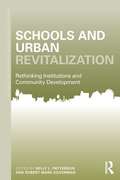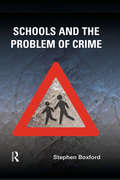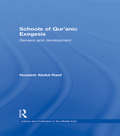- Table View
- List View
School's Out: Gay and Lesbian Teachers in the Classroom
by Catherine ConnellHow do gay and lesbian teachers negotiate their professional and sexual identities at work, given that these identities are constructed as mutually exclusive, even as mutually opposed? Using interviews and other ethnographic materials from Texas and California, School's Out explores how teachers struggle to create a classroom persona that balances who they are and what's expected of them in a climate of pervasive homophobia. Catherine Connell's examination of the tension between the rhetoric of gay pride and the professional ethic of discretion insightfully connects and considers complicating factors, from local law and politics to gender privilege. She also describes how racialized discourses of homophobia thwart challenges to sexual injustices in schools. Written with ethnographic verve, School's Out is essential reading for specialists and students of queer studies, gender studies, and educational politics.
School-Age Pregnancy and Parenthood: Biosocial Dimensions
by Beatrix A. HamburgThis important work examines in detail and depth how, as a consequence of changing technologies, diet, patterns of reproduction, and work, relations between children and parents have altered.The editors and contributors hold that biosocial science is particularly relevant to research on human family systems and parenting behavior. The family is the universal social institution in which the care of children is based and the turf where cultural tradition, beliefs, and values are transmitted to the young as they fulfill their biological potential for growth, development and reproduction. The biosocial perspective takes into account the biological substratum and the social environment as critical co-determinants of behavior and pinpoints areas in which contemporary human parental behavior exhibits continuities with and departures from, patterns evident throughout history.This work crosses disciplinary lines without ignoring their relevance to the broader themes of the book. School age pregnancy and parenthood is a powerful anchor for the dissection of large scale issues. The contributors deal in turn with ethnic and historical experience, examine normative and ethical issues, and cast new light on methodological concerns. What the editors call culturally-defined responses to basic needs helps explain both dramatic improvements in this area, and how they expand the challenge of teen reproduction. Contributors emphasize new demands for training and education to research this growing phenomenon. The book contributes to humane concerns as well as the scientific imagination.
School-Based Drug Prevention
by James Chiesa Rosalie Liccardo Pacula Jonathan P. Caulkins Susan M. PaddockSchool-based drug prevention, popular with the public and politicians alike, is now a nearly universal experience for American youth. Analysis has shown that the best programs can reduce use of a wide range of substances. But questions remain regarding how to think about and, hence, fund, these programs. Should they be viewed principally as weapons in the war against illicit drugs, or, at the other extreme, do prevention programs benefit students and society most by reducing use of alcohol and tobacco? The authors address these questions by comparing for the first time the social benefits of school-based prevention programs' long-run impacts on a diverse set of different substances.
School-Based Observation: A Practical Guide to Assessing Student Behavior
by Amy M. Briesch Robert J. Volpe Randy G. FloydWidely used to assess social–emotional and behavioral referral concerns in grades PreK–12, systematic direct observation is an essential skill for school psychologists and other educators. This accessible book helps practitioners conduct reliable, accurate observations using the best available tools. Chapters present effective coding systems for assessing student classroom behavior, the classroom environment, behavior in non-classroom settings, and behavior in a functional assessment context; also provided are guidelines for developing new codes when an appropriate one does not already exist. Procedures for summarizing, graphing, and interpreting data for different assessment purposes are detailed. In a large-size format with lay-flat binding for easy photocopying, the book includes 13 reproducible coding forms. Purchasers get access to a Web page where they can download and print the reproducible materials. This book is in The Guilford Practical Intervention in the Schools Series, edited by T. Chris Riley-Tillman.
School-Linked Services: Promoting Equity for Children, Families, and Communities
by Laura Bronstein Susan MasonThe evidence-based strategies in this volume close the achievement gap among students from all sociological backgrounds. Designed according to local needs assessments, they provide the services, programs, initiatives, and relationships that are crucial for children's success in school and life.These practices and programs include afterschool and summer sessions, early-childhood education, school-linked health and mental health services, family engagement, and youth leadership opportunities. This book addresses the policy and funding requirements that help these partnerships thrive and offers effective counterarguments against those who would question their value. The text describes strategies that work in both rural and urban contexts and includes a chapter evaluating school-community partnerships across the world. Because it involves collaborations across professions and organizations, the book's interdisciplinary approach will appeal to those in social work, education, psychology, public health, counseling, nursing, and public policy.
Schooldays in Imperial Japan: A Study in the Culture of a Student Elite
by Donald T. RodenThis title is part of UC Press's Voices Revived program, which commemorates University of California Press’s mission to seek out and cultivate the brightest minds and give them voice, reach, and impact. Drawing on a backlist dating to 1893, Voices Revived makes high-quality, peer-reviewed scholarship accessible once again using print-on-demand technology. This title was originally published in 1980.
Schoolgirls, Money and Rebellion in Japan (Nissan Institute/Routledge Japanese Studies)
by Sharon KinsellaJapanese society in the 1990s and 2000s produced a range of complicated material about sexualized schoolgirls, and few topics have caught the imagination of western observers so powerfully. While young Japanese girls had previously been portrayed as demure and obedient, in training to become the obedient wife and prudent mother, in recent years less than demure young women have become central to urban mythology and the content of culture. The cultic fascination with the figure of a deviant school girl, which has some of its earliest roots in the nineteenth and early twentieth centuries, likewise re-emerged and proliferated in fascinating and timely ways in the 1990s and 2000s. Through exploring the history and politics underlying the cult of girls in contemporary Japanese media and culture, this book presents a striking picture of contemporary Japanese society from the 1990s to the start of the 2010s. At its core is an in-depth case study of the media delight and panic surrounding delinquent prostitute schoolgirls. Sharon Kinsella traces this social panic back to male anxieties relating to gender equality and female emancipation in Japan. In each chapter in turn, the book reveals the conflicted, nostalgic, pornographic, and at times distinctly racialized manner, in which largely male sentiments about this transformation of gender relations have been expressed. The book simultaneously explores the stylistic and flamboyant manner in which young women have reacted to the weight of an obsessive and accusatory male media gaze. Covering the often controversial subjects of compensated dating (enjo kôsai), the role of porn and lifestyle magazines, the historical sources and politicized social meanings of the schoolgirl, and the racialization of fashionable girls, Schoolgirls, Money, Rebellion in Japan will be invaluable to students and scholars of Japanese culture and society, sociology, anthropology, gender and women's studies.
Schoolgirls: Young Women, Self Esteem, and the Confidence Gap
by Peggy OrensteinA NEW YORK TIMES NOTABLE BOOK OF THE YEAR. The classic account of the hurdles facing adolescent girls in America--now reissued with a new Foreword, to coincide with the award-winning author's new book on women and identity.Inspired by a study by the American Association of University Women that showed girls' self-esteem plummeting as they reach adolescence, Peggy Orenstein spent months observing, interviewing, and getting know dozens of girls both inside and outside the classroom at two very different schools in northern California. The result was a groundbreaking book in which she brought the disturbing statistics to life with skill and flair of an experienced journalist. Orenstein plumbs the minds of both boys and girls who have learned to equate masculinity with opportunity and assertiveness, and femininity with reserve and restraint. She demonstrates the cost of this insidious lesson, by taking us into the lives of real young women who are struggling with eating disorders, sexual harassment, and declining academic achievement, especially in math and science. Peggy Orenstein's SchoolGirls is a classic that belongs on the shelf with the work of Carol Gilligan, Joan Jacobs Brumberg, and Mary Pipher. It continues to be read by all who care about how our schools and our society teach girls to shortchange themselves.
Schooling Comprehensive Kids: Pupil Responses to Education (Routledge Revivals)
by Amanda PalmerFirst published in 1998, this volume is based upon an ethnographic study of white and black in a mixed comprehensive school conducted during the 1980s and explores differentiation in the classroom, looking at gender, colour and class differences within groups of students. The findings are discussed in the light of the strong debate within the sociology of education that took place during the 1970s and 1980s concerning academic achievement and underachievement. Amanda Palmer reveals, in contribution to this debate, that class origins played a primary role in the formation of pupils’ attitudes towards school and that class, race and gender were involved in how teachers reacted to pupils
Schooling Jim Crow: The Fight for Atlanta's Booker T. Washington High School and the Roots of Black Protest Politics (Carter G. Woodson Institute Series)
by Jay Winston Driskell Jr.In 1919 the NAACP organized a voting bloc powerful enough to compel the city of Atlanta to budget $1.5 million for the construction of schools for black students. This victory would have been remarkable in any era, but in the context of the Jim Crow South it was revolutionary. Schooling Jim Crow tells the story of this little-known campaign, which happened less than thirteen years after the Atlanta race riot of 1906 and just weeks before a wave of anti-black violence swept the nation in the summer after the end of World War I. Despite the constant threat of violence, Atlanta's black voters were able to force the city to build five black grammar schools and Booker T. Washington High School, the city's first publicly funded black high school. Schooling Jim Crow reveals how they did it and why it matters.In this pathbreaking book, Jay Driskell explores the changes in black political consciousness that made the NAACP's grassroots campaign possible at a time when most black southerners could not vote, let alone demand schools. He reveals how black Atlantans transformed a reactionary politics of respectability into a militant force for change. Contributing to this militancy were understandings of class and gender transformed by decades of racially segregated urban development, the 1906 Atlanta race riot, Georgia's disfranchisement campaign of 1908, and the upheavals of World War I. On this cultural foundation, black Atlantans built a new urban black politics that would become the model for the NAACP's political strategy well into the twentieth century.
Schooling Sexual Cultures: Visual Research in Sexuality Education (Routledge Critical Studies in Gender and Sexuality in Education)
by Louisa AllenMoving beyond the traditional focus on curriculum and pedagogy, this volume explores hidden dimensions of sexuality education in schools and how sexual meanings are produced. Challenging the standard understandings of sexuality education, Allen discusses how students’ knowledge of sexualities is often learnt outside the ‘official’ school curriculum in informal spaces such as the sports field, gym locker rooms and peer groups. By employing visual methods and analysing student photo-diaries, Allen’s original book captures a sexual culture of schooling that allow readers to literally ‘see through young people’s eyes.’ Introducing theoretical ideas in relation to queer theory and ‘new’ feminist new materialisms, this volume calls for a re-conceptualization of how sexuality comes into being at school, in order to take account of its material, spatial and embodied elements.
Schooling and State Formation in Early Modern Sweden (Palgrave Studies in the History of Childhood)
by Bengt SandinIn this book the emergence of schools in urban Sweden between the seventeenth and the nineteenth century provides the framework for a history of children and of childhood. It is a study through the lens of the changes in early modern education, spatial aspect of the life of children and systems of governance in the early modern Swedish state. Educational systems defined the spatial aspects of childhood—where children were supposed to grow up, in the home, the school, the streets and alleys, or the place of work—over a period of about two hundred years. Schools and education represent both a mental and a physical space; an abstract place for children as well as a local and concrete place for them, which stood out against the alternative spatial aspects of the life of children. It is also a study of how different cultural systems influence the definitions of childhood and schools, in the context of church and home instruction, poor relief, policing, surveillance, and the question of why children went to schools. It examines the role of the school as childcare and as a provider of food, shelter and welfare, and as governance.
Schooling for Resilience: Improving the Life Trajectory of Black and Latino Boys (Youth Development and Education Series)
by Pedro Noguera Edward Fergus Margary MartinAs a group, Black and Latino boys face persistent and devastating disparities in achievement when compared to their White counterparts: they are more likely to obtain low test scores and grades, be categorized as learning disabled, be absent from honors and gifted programs, and be overrepresented among students who are suspended and expelled from school. They are also less likely to enroll in college and more likely to drop out. Put simply, they are among the most vulnerable populations in our schools.Schooling for Resilience investigates how seven newly formed schools, created specifically to serve boys of color, set out to address the broad array of academic and social problems faced by Black and Latino boys. Drawing on student and teacher surveys, focus groups, interviews, and classroom observations, the authors investigate how these schools were developed, what practices they employed, and how their students responded academically and socially. In particular, they focus on the theory of action that informed each school&’s approach to educating Black and Latino boys and explore how choices about school structure and culture shaped students&’ development and achievement. In doing so, the authors identify educational strategies that all schools can learn from. This thoughtful, passionately argued volume promises to influence efforts to improve the achievement and life outcomes of Black and Latino boys for years to come.
Schooling for Sustainable Development in Chinese Communities
by Michael Williams John Chi-Kin LeeThis book focuses on the academic foundations, trends and traditions of environmental education for sustainable development principally in Chinese contexts. It highlights contexts and case studies that illuminate recent Chinese initiatives. It includes case studies of green schools and reports on recent initiatives in school-based ESD curriculum development programmes in China, Hong Kong, Macao and Taiwan. The book concludes with an overview chapter that points to likely future developments. The assumption underpinning the book is that experiences gained in such a major country as China will be of real interest to geographical and environmental educationists, professional educators and teachers elsewhere. Not only will it generate interest and create greater awareness but also it is hoped that these experiences will provide a platform for scholarly exchange and contribute insights on education policy and curriculum changes across Asian-Pacific communities in an increasingly globalised world.
Schooling the Freed People: Teaching, Learning, and the Struggle for Black Freedom, 1861-1876
by Ronald E. ButchartConventional wisdom holds that freedmen's education was largely the work of privileged, single white northern women motivated by evangelical beliefs and abolitionism. Schooling the Freed People shatters this notion entirely. For the most comprehensive quantitative study of the origins of black education in freedom ever undertaken, Ronald E. Butchart combed the archives of all of the freedmen's aid organizations as well as the archives of every southern state to compile a vast database of over 11,600 individuals who taught in southern black schools between 1861 and 1876. Based on this path-breaking research, he reaches some surprising conclusions: one-third of the teachers were African Americans; black teachers taught longer than white teachers; half of the teachers were southerners; and even the northern teachers were more diverse than previously imagined. His evidence demonstrates that evangelicalism contributed much less than previously believed to white teachers' commitment to black students, that abolitionism was a relatively small factor in motivating the teachers, and that, on the whole, the teachers' ideas and aspirations about their work often ran counter to the aspirations of the freed people for schooling. The crowning achievement of a veteran scholar, this is the definitive book on freedmen's teachers in the South as well as an outstanding contribution to social history and our understanding of African American education.
Schooling the Generations in the Politics of Prison
by ChinosoleSchooling the Generations in the Politics of Prison
Schooling the Next Generation
by Dan ZuberiPublic schools are among the most important institutions in North American communities, especially in disadvantaged urban neighbourhoods. At their best, they enable students to overcome challenges like poverty by providing vital literacy and numeracy skills. At their worst, they condemn students to failure, both economically and in terms of preparing them to be active participants in a democratic society.In Schooling the Next Generation, Dan Zuberi documents the challenges facing ten East Vancouver elementary schools in diverse lower-income communities, as well as the ways their principals, teachers, and parents are overcoming these challenges. Going beyond the façade of standardized test scores, Zuberi identifies the kinds of school and community programs that are making a difference and could be replicated in other schools. At the same time, he calls into question the assumptions behind a test score-driven search for "successful schools." Focusing on early literacy and numeracy skills mastery, Schooling the Next Generation presents a slate of policy recommendations to help students in urban elementary schools achieve their full potential.
Schooling the System: A History of Black Women Teachers (Rethinking Canada in the World #8)
by Funké AladejebiIn post–World War II Canada, black women’s positions within the teaching profession served as sites of struggle and conflict as the nation worked to address the needs of its diversifying population. From their entry into teachers’ college through their careers in the classroom and administration, black women educators encountered systemic racism and gender barriers at every step. So they worked to change the system.Using oral narratives to tell the story of black access and education in Ontario between the 1940s and the 1980s, Schooling the System provides textured insight into how issues of race, gender, class, geographic origin, and training shaped women’s distinct experiences within the profession. By valuing women’s voices and lived experiences, Funké Aladejebi illustrates that black women, as a diverse group, made vital contributions to the creation and development of anti-racist education in Canada. As cultural mediators within Ontario school systems, these women circumvented subtle and overt forms of racial and social exclusion to create resistive teaching methods that centred black knowledges and traditions. Within their wider communities and activist circles, they fought to change entrenched ideas about what Canadian citizenship should look like.As schools continue to grapple with creating diverse educational programs for all Canadians, Schooling the System is a timely excavation of the meaningful contributions of black women educators who helped create equitable policies and practices in schools and communities.
Schoolishness: Alienated Education and the Quest for Authentic, Joyful Learning
by Susan D. BlumIn Schoolishness, Susan D. Blum continues her journey as an anthropologist and educator. The author defines "schoolishness" as educational practices that emphasize packaged "learning," unimaginative teaching, uniformity, constant evaluation by others, arbitrary forms, predetermined time, and artificial boundaries, resulting in personal and educational alienation, dependence, and dread.Drawing on critical, progressive, and feminist pedagogy in conversation with the anthropology of learning, and building on the insights of her two previous books Blum proposes less-schoolish ways of learning in ten dimensions, to lessen the mismatch between learning in school and learning in the wild. She asks, if learning is our human "superpower," why is it so difficult to accomplish in school? In every chapter Blum compares the fake learning of schoolishness with successful examples of authentic learning, including in her own courses, which she scrutinizes critically.Schoolishness is not a pedagogical how-to book, but a theory-based phenomenology of institutional education. It has moral, psychological, and educational arguments against schoolishness that, as Blum notes, "rhymes with foolishness."
Schools Then and Now
by Cynthia Swain Tara FunkWhat were some schools like long ago? How are schools different today?
Schools and Screens: A Watchful History
by Victoria CainWhy screens in schools—from film screenings to instructional television to personal computers—did not bring about the educational revolution promised by reformers.Long before Chromebook giveaways and remote learning, screen media technologies were enthusiastically promoted by American education reformers. Again and again, as schools deployed film screenings, television programs, and computer games, screen-based learning was touted as a cure for all educational ills. But the transformation promised by advocates for screens in schools never happened. In this book, Victoria Cain chronicles important episodes in the history of educational technology, as reformers, technocrats, public television producers, and computer scientists tried to harness the power of screen-based media to shape successive generations of students. Cain describes how, beginning in the 1930s, champions of educational technology saw screens in schools as essential tools for training citizens, and presented films to that end. (Among the films screened for educational purposes was the notoriously racist Birth of a Nation.) In the 1950s and 1960s, both technocrats and leftist educators turned to screens to prepare young Americans for Cold War citizenship, and from the 1970s through the 1990s, as commercial television and personal computers arrived in classrooms, screens in schools represented an increasingly privatized vision of schooling and civic engagement. Cain argues that the story of screens in schools is not simply about efforts to develop the right technological tools; rather, it reflects ongoing tensions over citizenship, racial politics, private funding, and distrust of teachers. Ultimately, she shows that the technologies that reformers had envisioned as improving education and training students in civic participation in fact deepened educational inequities.
Schools and Styles of Anthropological Theory
by Matei CandeaThis book presents an overview of important currents of thought in social and cultural anthropology, from the 19th century to the present. It introduces readers to the origins, context and continuing relevance of a fascinating and exciting kaleidoscope of ideas that have transformed the humanities and social sciences, and the way we understand ourselves and the societies we live in today. Each chapter provides a thorough yet engaging introduction to a particular theoretical school, style or conceptual issue. Together they build up to a detailed and comprehensive critical introduction to the most salient areas of the field. The introduction reflects on the substantive themes which tie the chapters together and on what the very notions of ‘theory’ and ‘theoretical school’ bring to our understanding of anthropology as a discipline. The book tracks a core lecture series given at Cambridge University and is essential reading for all undergraduate students undertaking a course on anthropological theory or the history of anthropological thought. It will also be useful more broadly for students of social and cultural anthropology, sociology, human geography and cognate disciplines in the social sciences and humanities.
Schools and Urban Revitalization: Rethinking Institutions and Community Development (Community Development Research and Practice Series)
by Robert Mark Silverman Kelly L. PattersonNew research in community development shows that institutions matter. Where the private sector disinvests from the inner city, public and nonprofit institutions step in and provide engines to economic revitalization and promote greater equity in society. Schools and Urban Revitalization collects emerging research in this field, with special interest in new school-neighborhood partnerships that lead today’s most vibrant policy responses to urban blight.
Schools and the Problem of Crime
by Stephen BoxfordWhat causes young people to offend? What influence do schools have on young peoples' offending behaviour in relation to other possible causal factors? These critical criminological and educational questions are addressed in Schools and the Problem of Crime. The book examines the causes of offending in the school context among 3,103, male and female, Year 10 pupils (age 14-15), in twenty state schools in Cardiff. The findings of one of the largest empirical studies of its kind in the UK are used to examine the role of schools, family background, neighbourhood, young peoples' social situation and dispositions, and lifestyles on pupils' offending behaviour. Critically, the interplay and relationships between these causal factors are disentangled in gaining a greater understanding as to why some young people offend in the school context and why some young people do not, as well as examining why some schools experience higher offending rates than others. The book employs an integrative analytical approach which is theoretically led. Through gaining an understanding of the factors that cause young people to offend it is envisaged that future crime prevention strategies can be better informed and targeted. major contribution to understanding youth crime and delinquency on basis of major Cambridge University research study focus on lifestyle factors important policy implications
Schools of Qur'anic Exegesis: Genesis and Development (Culture and Civilization in the Middle East)
by Hussein Abdul-RaofQur’anic exegesis has become the battleground of political Islam and theological conflict among various Muslim schools of thought. Using comparative and contrastive methodology, examples from the Qur'an are investigated in the light of various theological views to delineate the birth, development and growth of Qur'anic exegesis. The political status quo, in the past and at present, has impinged upon Qur’anic exegesis more than on any other discipline in Islamic studies. This book illustrates the dichotomy between mainstream and non-mainstream Islam, showing how Qur’anic exegesis reflects the subtle dogmatic differences and political cleavages in Islamic thought. Chapters explore in depth the intrusive views of the compilers of early exegesis manuscripts, the scepticism among Western scholars about the authenticity of early Muslim works of exegesis and of prophetic tradition, and the role of exegesis as a tool to reaffirm the Qur’an as a canon. Written to appeal to those with comparative exegetical interests as well as those focused on Islamic studies in general, this book will be an important reference for research students, scholars, and students of Islamic Studies, Theology, Religious studies and Middle Eastern Studies.
